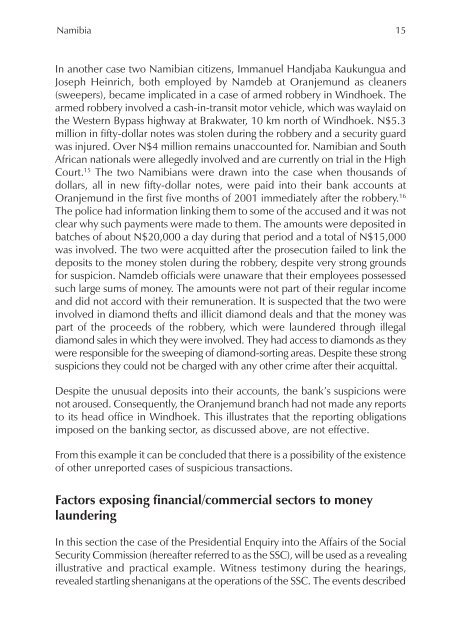Monograph 108 complete download - Institute for Security Studies
Monograph 108 complete download - Institute for Security Studies
Monograph 108 complete download - Institute for Security Studies
Create successful ePaper yourself
Turn your PDF publications into a flip-book with our unique Google optimized e-Paper software.
Namibia<br />
15<br />
In another case two Namibian citizens, Immanuel Handjaba Kaukungua and<br />
Joseph Heinrich, both employed by Namdeb at Oranjemund as cleaners<br />
(sweepers), became implicated in a case of armed robbery in Windhoek. The<br />
armed robbery involved a cash-in-transit motor vehicle, which was waylaid on<br />
the Western Bypass highway at Brakwater, 10 km north of Windhoek. N$5.3<br />
million in fifty-dollar notes was stolen during the robbery and a security guard<br />
was injured. Over N$4 million remains unaccounted <strong>for</strong>. Namibian and South<br />
African nationals were allegedly involved and are currently on trial in the High<br />
Court. 15 The two Namibians were drawn into the case when thousands of<br />
dollars, all in new fifty-dollar notes, were paid into their bank accounts at<br />
Oranjemund in the first five months of 2001 immediately after the robbery. 16<br />
The police had in<strong>for</strong>mation linking them to some of the accused and it was not<br />
clear why such payments were made to them. The amounts were deposited in<br />
batches of about N$20,000 a day during that period and a total of N$15,000<br />
was involved. The two were acquitted after the prosecution failed to link the<br />
deposits to the money stolen during the robbery, despite very strong grounds<br />
<strong>for</strong> suspicion. Namdeb officials were unaware that their employees possessed<br />
such large sums of money. The amounts were not part of their regular income<br />
and did not accord with their remuneration. It is suspected that the two were<br />
involved in diamond thefts and illicit diamond deals and that the money was<br />
part of the proceeds of the robbery, which were laundered through illegal<br />
diamond sales in which they were involved. They had access to diamonds as they<br />
were responsible <strong>for</strong> the sweeping of diamond-sorting areas. Despite these strong<br />
suspicions they could not be charged with any other crime after their acquittal.<br />
Despite the unusual deposits into their accounts, the bank’s suspicions were<br />
not aroused. Consequently, the Oranjemund branch had not made any reports<br />
to its head office in Windhoek. This illustrates that the reporting obligations<br />
imposed on the banking sector, as discussed above, are not effective.<br />
From this example it can be concluded that there is a possibility of the existence<br />
of other unreported cases of suspicious transactions.<br />
Factors exposing financial/commercial sectors to money<br />
laundering<br />
In this section the case of the Presidential Enquiry into the Affairs of the Social<br />
<strong>Security</strong> Commission (hereafter referred to as the SSC), will be used as a revealing<br />
illustrative and practical example. Witness testimony during the hearings,<br />
revealed startling shenanigans at the operations of the SSC. The events described
















